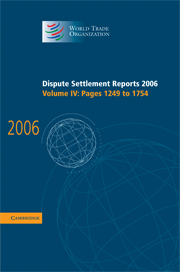European Communities - Measures Affecting the Approval and Marketing of Biotech Products (WT/DS291, WT/DS292, WT/DS293): Report of the Panel
Published online by Cambridge University Press: 12 December 2017
Summary
FINDINGS
The Panel observes that the United States, Canada, Argentina and the European Communities (hereafter “the Parties”) have used different terms to refer to the products at issue in this dispute. The separate requests for the establishment of a panel by the United States, Canada and Argentina (hereafter collectively referred to as “the Complaining Parties”) all refer to measures affecting “biotech products”. The European Communities’ legislation identified by all of the Parties as relevant to the case in hand refers to genetically modified organisms (hereafter “GMOs”). All of the Parties to the dispute agree that, technically, the specific products at issue in this case are plants (and the products thereof) developed through the use of recombinant DNA techniques.
In its consideration of the matter before it, the Panel uses interchangeably the terms biotech products, GMOs, GM plants, GM crops or GM products, without prejudice to the views of the Parties to the dispute.
Procedural and other general matters
In this opening section, we address a number of procedural and other general matters. First of all, we explain how in preparing this document we have taken account of the fact that the Complaining Parties in this dispute have brought legally separate complaints. Then we set out how we have dealt with the unsolicited amicus curiae briefs sent to the Panel. Next we address how we have reached and implemented our decision to consult individual scientific experts and international organizations. We then go on to explain that certain annexes to this document are available only on-line, and we offer some general remarks on the challenges faced by the Panel in conducting these proceedings. After that, we reproduce in full our preliminary ruling on whether the Complaining Parties’ separate requests for the establishment of a panel are inconsistent with Article 6.2 of the DSU, as claimed by the European Communities. Finally, we address the issue of the relevance of non-WTO rules of international law to the interpretation of the WTO agreements at issue in this dispute.
Multiple complaints
The Complaining Parties in this dispute did not bring a joint complaint against the European Communities. Instead, they filed legally separate complaints, and separately requested the establishment of a panel.
- Type
- Chapter
- Information
- Dispute Settlement Reports 2006 , pp. 1251 - 1754Publisher: Cambridge University PressPrint publication year: 2008
- 3
- Cited by



